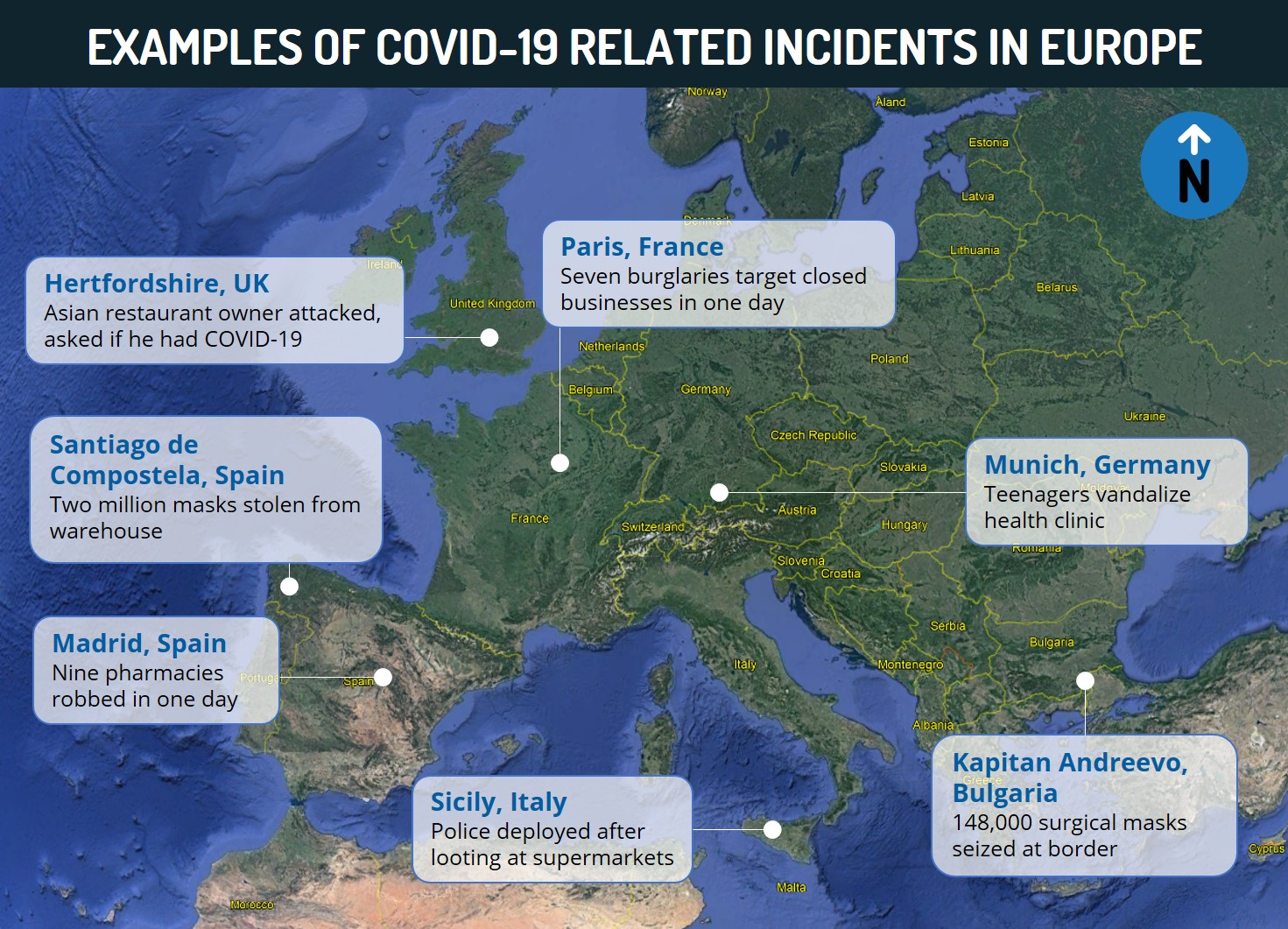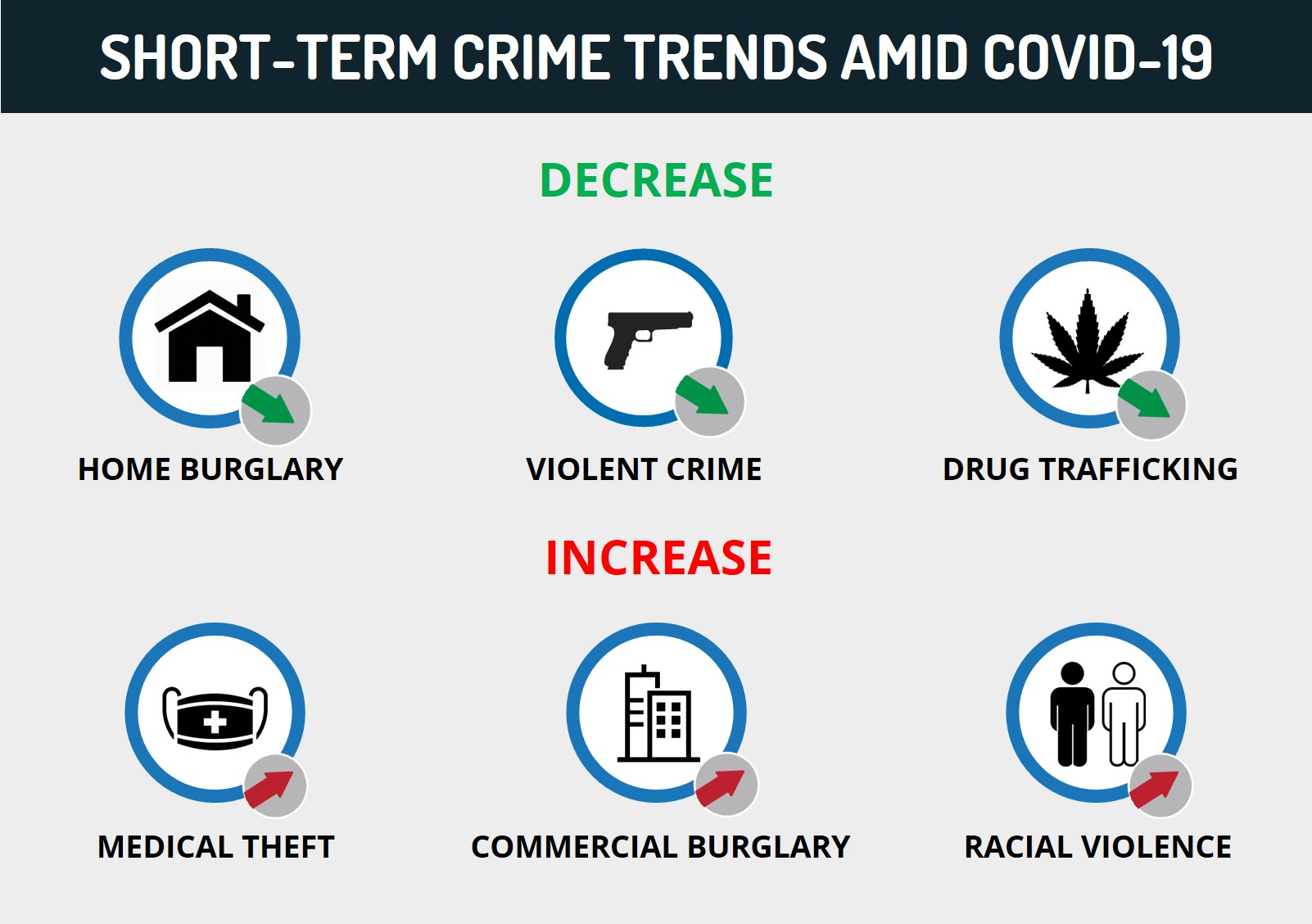Executive Summary
Since the introduction of COVID-19 restrictions in February-March, multiple countries across Europe reported a significant drop in home burglaries, violent robberies, and thefts. Meanwhile the region saw an increase in burglaries at commercial establishments, theft of medical supplies, as well as racial and domestic violence.
The expected economic downturn from the lockdown will likely lead to a return to pre-crisis rates or an increase in robberies and other violent crimes and in anti-establishment sentiments while presenting human traffickers new opportunities in the long-term.
In the short-to-medium term, the disruption of narcotics supply chains will likely lead to low-level drug dealers shifting to alternative crimes, such as burglary and armed robberies, and the sale of more dangerous alternatives. Going forward, supply shortages and increasing demand for illicit drugs may increase gang-violence as restrictions begin to ease.
Nonessential travel within Europe should be voided as per government directives amid COVID-19, while remaining cognizant of local criminal activity.
Current Situation
Decrease in home burglaries, violent robberies, and drug trafficking
Multiple countries have reported a shift in criminal activity since February when countries began implementing COVID-19 precautionary measures.
Spanish police recorded a roughly 50 percent decline in criminal offenses compared to the same period in 2019 since the partial lockdown on March 14.
French authorities reported a 45 percent drop in crime rates between March-April, with the most significant decreases seen in burglaries of accommodation, robberies with weapons, and vehicle thefts.
Italy witnessed a 72 percent decrease in home robberies in March 2020 compared to 2019, while other robberies dropped by roughly 54 percent and drug-related offenses by 46 percent.
Dutch, German, Greek, Irish, and Swedish authorities witnessed a similar reduction in thefts and burglaries, with thefts in Greece dropping by 25 percent as of April.
Slovenia witnessed a recent decrease in burglaries, robberies in residential areas, and property crimes compared to 2018.
Knife crime reportedly declined in London in the latter half of March, while public violence and home burglaries decreased across the UK.
The French anti-narcotics agency, OFAST, reported in early April that the suspension of air traffic significantly disrupted the inflow of cocaine. Reports also indicate that supply shortages have also been recorded in Germany since the closing of borders. Nonetheless, trafficking networks have attempted to smuggle drugs via cargo. In the UK, drug treatment experts warned that a drop in the supply of narcotics has resulted in users turning to more dangerous alternatives such as the synthetic opioid Fentanyl, which can be obtained with a prescription.
Increase in commercial burglaries, theft of medical supplies, domestic and racial violence
Despite the decrease in certain crimes, other offenses have witnessed an uptick.
Large numbers of scams, thefts, and the illegal sale of medical supplies were recorded across Europe in recent months. Three pharmacists in southern France were arrested for illegally reselling face masks, as per March 28 reports. Individuals were arrested in Hungary and the Netherlands for scamming individuals and hospitals into buying non-existent protective masks. On March 23, oxygen canisters were stolen from a hospital in the UK. Multiple incidents of verbal and violent attacks on healthcare workers and vandalism of ambulances were also reported across the region. Interpol stated that organized crime is thriving by trading in counterfeit goods due to an increased demand for medical and hygiene products.
Multiple countries recorded an increase in burglaries at closed commercial establishments, pharmacies, and other stores that remain open, with Madrid recording nine pharmacy robberies in one day. In Italy, theft and robbery of pharmacies has only decreased by about 13 percent compared to the overall drop of robberies of between 54 and 72 percent. Meanwhile, authorities in Sicily bolstered security near supermarkets and grocery stores as a result of an uptick in shoplifting.
There are also reports of organized criminal groups across southern Italy using the situation to extort local enterprises in need of short-term loans to cover the commercial losses.
In terms of anti-foreign sentiment, there have been a number of notable incidents targeting individuals of Asian descent in recent weeks. In the UK, the owner of a Chinese restaurant was attacked by a group in Hertfordshire, before being asked if the victim had COVID-19. An individual of Asian descent was assaulted in Munich, Germany, with the assailant spraying disinfectant in the victim’s face while yelling “corona.”
Finally, countries across Europe have reported a surge in domestic violence since the start of lockdowns. Within the first week since March 17, there was a 32 percent increase in France’s domestic violence cases and a 36 percent increase in Paris. Spain witnessed an 18 percent increase and the UK a 25 percent increase in calls and online requests concerning domestic abuse since the beginning of the lockdown.
Assessments & Forecast
Economic downturn resulting from lockdown to increase domestic burglaries, property vandalism, and organized crime in the medium-to-long term
Given that the lockdowns have significantly altered the activity of the public and criminals alike, the drop in residential burglaries, violent theft, public violence, and knife crimes is a direct effect of the quarantine measures limiting the opportunities for crimes of this nature. Therefore, it is unlikely for this trend to persist as restrictions begin to ease.
On the contrary, with the economic impact of the lockdowns likely to be felt well beyond their removal, domestic burglaries, thefts, and ATM robberies are liable to gradually rise following the easing of restrictions.
With studies following the economic crash in 2008 demonstrating a correlation between rising homicide and assault rates and economic downturns, the expected economic crisis is also liable to trigger an increase in violent crimes, especially among relatively socioeconomically underdeveloped communities. As a result of economic stress, violent robberies in relatively wealthier neighborhoods and vehicular theft are liable to rise as a means to earn money.
With certain sections of the society, especially urban youth, being likely to be disproportionately affected by the economic slowdown, these worst affected groups are liable to increasingly engage in criminal behavior. Rising poverty and unemployment resulting from the lockdowns are likely to create opportunities for organized criminal networks to increase trafficking activities and recruitment. Countries that already had a significant presence of organized crime are liable to witness increased activity. As demonstrated in southern Italy, such groups are liable to take advantage of the increased potential for human smuggling, extortion, racketeering, and money laundering, embedding themselves in local economies for the long-term. This may be exacerbated as criminal groups look to gain a footing in local businesses in order to benefit from any potential government bailouts which may look to help small businesses and the self-employed.
Popular discontent among the sectors of society most affected by job cuts and economic downturn will likely result in increasing anti-establishment sentiments and resentment towards governments and certain organizations. Companies that undertook more severe job cuts and failed to provide employees with adequate compensation are liable to be the primary targets of protests and vandalism in the months following the removal of lockdown measures.
Illicit drug shortages to see low-level dealers shift to alternative crimes in short-to-medium term and increase gang violence in the long-term
In addition to international border restrictions having significantly impacted the supply of illicit drugs from South America and Asia, they are likely to have reduced access to chemical precursors used in the production of methamphetamine, heroin, and cocaine that are largely procured from China. Given that travel restrictions to and from China were among the first to be introduced, the production of drugs has likely been impacted since January. The liquidity of trafficking groups has also likely been severely affected, especially among the mafia of Albania and Italy, with merchants unable to pay extortion fees amid lockdowns.
Due to movement restrictions during lockdowns, low-level criminals, who otherwise rely on the sale of drugs on the streets, are liable to resort to the other crimes, such as theft of medical supplies and burglaries or armed robbery to maintain a source of income. Additionally, due to shortages in the supply of heroin, dealers may also resort to the sale of more dangerous alternatives like fentanyl, which are easier to procure, store, and transport in smaller batches. In addition, supply chain issues will likely put considerable pressure on any domestic supplies in Europe, most likely Cannabis, which can be grown in makeshift greenhouses. This may catalyze a short term increase in local production, especially with police likely not focusing on such issues at present.
As restrictions begin to ease, while trafficking routes for illicit drugs will open up, the demand for cocaine and heroin is likely to be significantly higher than supply, especially in Western Europe. The resulting high prices are likely to lead to violent confrontations between gangs fighting over control of the limited supplies. With this, gun violence and homicide rates could see a rise following the reopening of borders. This is likely to be primarily focussed in urban and suburban areas that typically see high levels of gang activity anyway, as well as potentially in major port towns.
Anti-foreign attacks to recur amid COVID-19 and after opening of borders
That attacks against individuals of Asian descent were recorded in multiple countries early on in the outbreak indicates that anti-Asian sentiments are liable to persist beyond the immediate crisis, especially as multiple countries begin to question China’s handling of the crisis. This is liable to raise perceptions of a deliberate attempt by China to mismanage the pandemic, in addition to fears of Asians being carriers of the virus. Increased rhetoric by international political leaders sometimes referring to the virus as ‘Chinese virus’ is liable to further strengthen xenophobic sentiments.
This increases the likelihood of Asian-owned companies being the target of attacks, vandalism, and protests by nationalist and xenophobic groups. As quarantine restrictions ease, the risk of foreign nationals operating or residing in Europe being verbally or physically harassed is liable to persist into the medium-term. Furthermore, Asian-linked companies and enterprises may witness decreased sales due to such sentiments.
Finally, there remains a likelihood of general xenophobic sentiments persisting due to the fear of foreigners being virus carriers, as evidenced with French visitors being harrassed in the German border town of Gersheim in April. This may result in an overall decrease in intra-European travel and tourism into the medium-term, as well as travelers being subject to harassment and abuse.
Recommendations
Avoid nonessential travel within Europe as per government directives amid COVID-19 while remaining cognizant of local criminal activity.
Remain cognizant of possible scams and sale of counterfeit medical and hygiene supplies.
Foreign residents across Europe are advised to maintain heightened vigilance due to the elevated potential for racially motivated harassment.
Facilities that are currently non-operational due to COVID-19 restrictions are advised to take additional precautions against possible vandalism and burglaries.

